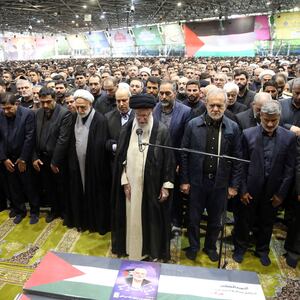Fears are mounting over prospects of a significant escalation of the war in Gaza, with the White House warning Tehran could attack Israel in a matter of days.
For now, it’s not entirely clear what kind of assault Iran might be looking to mount in retaliation for the bombing that killed Hamas political leader Ismail Haniyeh at a guest house in the Iranian capital two weeks ago.
But John Kirby, White House national security spokesman, said the Biden administration shared Israel’s concerns on the timing of any Iranian action. “Could be this week,” Kirby told reporters on Monday. “We have to be prepared for what could be a significant set of attacks.”
ADVERTISEMENT
Kirby added that the U.S. had greatly increased its “force posture and capabilities in the region” over the past few days. This has seen the deployment of further fighter jets, naval warships and even a nuclear-powered submarine to the Middle East, as Iranian commanders prepare to carry out Ayatollah Ali Khamenei’s orders to “harshly punish” Israel for Haniyeh’s assassination.
It wouldn’t mark the first time Iran has directly attacked Israel since Hamas swept into Israel, killing more than 1,100 people, on Oct. 7. In April, this year after Israeli forces had bombed the Iranian embassy in Damascus, Iran responded by firing several hundred rockets toward Israeli territory.
Though the bombardment appeared to have drawn the crisis in the Middle East to a razor’s edge, most of the missiles were intercepted, with those that made it through resulting in only a small number of injuries and minor damage to a handful of air bases. The attack was therefore largely seen as a show of force, with Iran telling the U.N. that matters could be “deemed concluded” in its aftermath.
This time, however, is different. While Israel has not claimed responsibility for Haniyeh’s assassination in the Iranian capital, the Netanyahu government hasn’t denied it either. Officials had previously vowed to kill Haniyeh and other senior Hamas leaders, and the killing came just hours after Israel successfully targeted a top Hezbollah commander in Beirut.
Conflicting reports have emerged over how Haniyeh’s execution was carried out—some suggested it may have been an airstrike, others that a remotely detonated bomb had been placed under the leader’s bed at the guest house in Tehran months in advance.
Whatever the exact method, the property was under the management of the Islamic Revolutionary Guard Corps. His assassination was therefore widely seen as a deeply humiliating security failure on the part of Iranian intelligence, with an investigation having since seen more than 20 individuals arrested, including senior officials and staff from the guest house.
Israel’s other Western partners are now engaged in a frantic scramble to keep ceasefire negotiations on the table, with France, Germany and the U.K. issuing a joint statement yesterday calling for the fighting to “end now,” urging the return of Israeli hostages still held by Hamas and the “unfettered delivery and distribution of aid” in Gaza.








